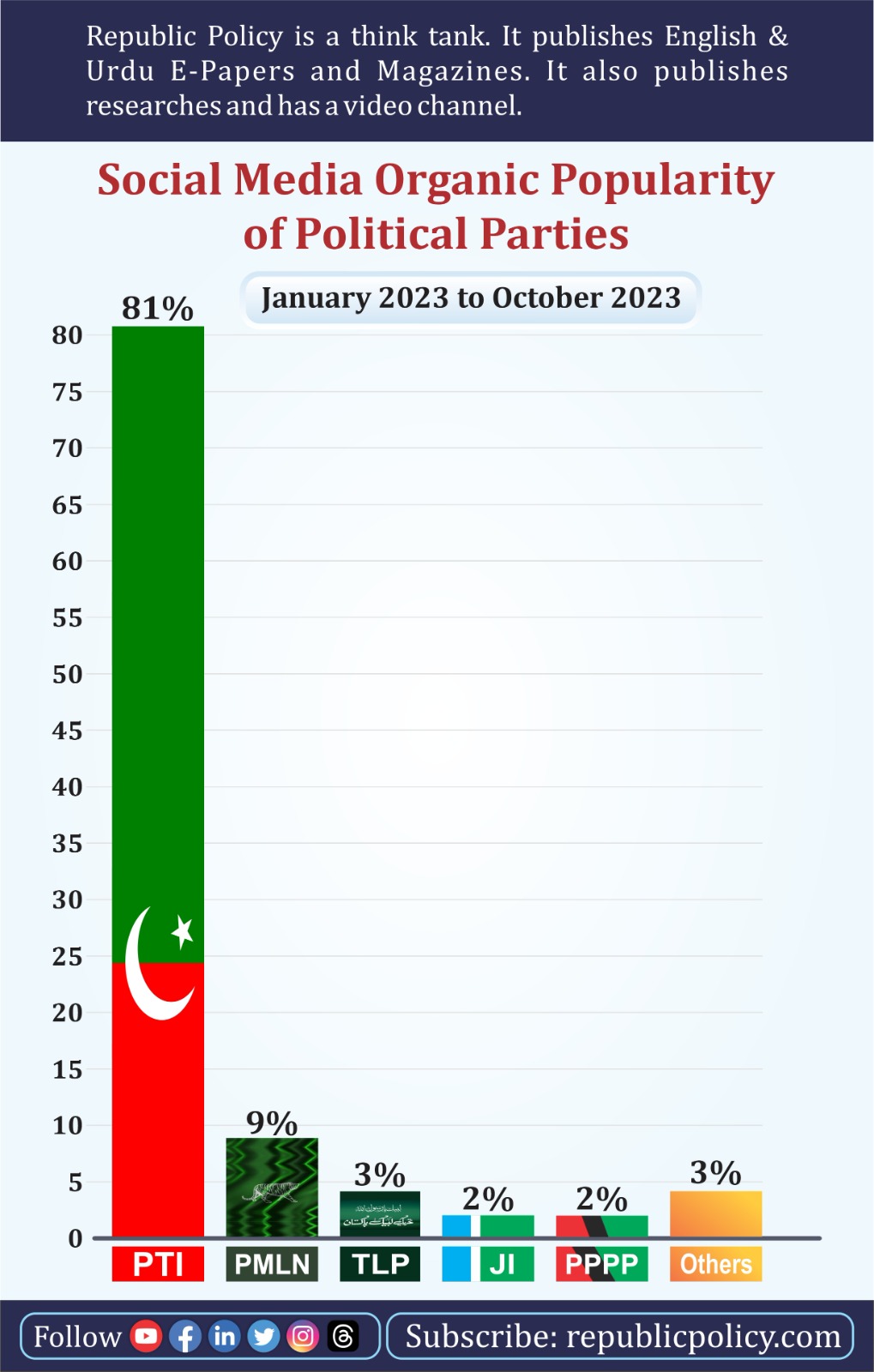Team Social Media Republic Policy
The digital industry is a broad term encompassing the economic activities of creating, distributing, and consuming digital products and services. It encompasses a wide range of activities, including software development, digital marketing, e-commerce, and social media. Social media is a form of digital communication that allows people to connect and share content. There are various social media platforms, including social networks, messaging apps, video-sharing, and photo-sharing platforms.
The digital economy is a broader term encompassing all economic activity facilitated by digital technologies. It includes various activities, such as e-commerce, digital content creation and distribution, online advertising, and digital payments. The strength of the digital economy lies in its ability to facilitate innovation, create new business models, and increase efficiency. It has transformed the way that businesses operate, creating new opportunities for entrepreneurs and small businesses to compete on a global scale.
The digital industry is rapidly growing in Pakistan, driven by a young and tech-savvy population, increasing internet penetration, and a supportive government policy. The country has a thriving e-commerce sector, with online marketplaces such as Daraz and OLX gaining popularity. The social media landscape in Pakistan is also evolving, with platforms such as Facebook, Instagram, and Twitter becoming increasingly popular among the country’s youth.
The digital industry is essential for a country’s economy because it can create new sources of growth, productivity, and competitiveness. It can also create new opportunities for employment, entrepreneurship, and innovation and improve access to education, health care, and financial services for millions of people. However, the digital industry also challenges the economy, such as the need for adequate infrastructure, regulation, skills development, and social protection. The digital sector can also widen the gap between those without access to and benefit from digital technologies.
The digital industry also impacts politics, both domestically and internationally. On the one hand, digital technologies can enable greater participation, transparency, accountability, and mobilization in political processes. For example, digital media can give citizens more information and platforms to express their opinions, organize protests, or monitor elections. On the other hand, digital technologies can also be used for manipulation, surveillance, censorship, and repression by authoritarian regimes or malicious actors.
As one can see, the digital industry is a complex and dynamic phenomenon with positive and negative effects on the economy and politics. It requires careful analysis and policy responses to maximize its benefits and minimize risks.
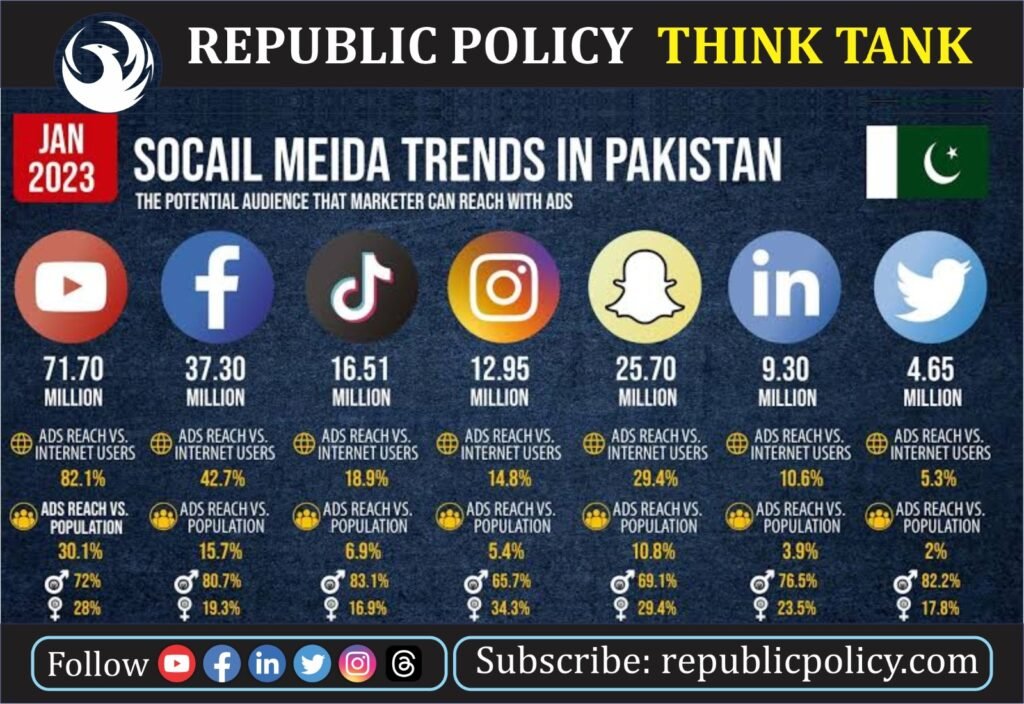
The development of the digital and social media industry in Pakistan has been rapid and remarkable in recent years. According to the report by Data Reportal, Pakistan had 98.2 million internet users, 53 million social media users, and 183.5 million mobile connections as of January 2023. The most popular social media platforms in Pakistan are YouTube, Facebook, WhatsApp, Instagram, and TikTok. The digital media market in Pakistan is also projected to grow from $469.7 million in 2020 to $1,009.8 million by 2025, with video-on-demand being the largest segment.
Pakistani political parties and leaders have also recognized the potential and significance of digital and social media for their campaigns and communication. They use social media to interact with citizens, mobilize supporters, disseminate information, counter criticism, and shape public opinion. According to a study by the Pakistan Institute of Legislative Development and Transparency (PILDAT), the Pakistan Tehreek-e-Insaf (PTI) was the most active and popular political party on Facebook and Twitter during the 2018 general elections, followed by the Pakistan Muslim League-Nawaz (PML-N) and the Pakistan Peoples Party (PPP). However, since 2018, the reach and excess of PTI have almost doubled. Furthermore, after the change in government in April 2022, the popularity of PTI has reached a new zenith in the digital industry in Pakistan.
The PTI also had the most followers on YouTube and Instagram among political parties in Pakistan as of March 2020, and the trend is the same even now, in November 2023. The PTI’s leader and former Prime Minister, Imran Khan, was also the most-followed politician on Facebook and Twitter in Pakistan as of March 2020. Since then, he has grown more potent in Pakistan’s digital industry. Currently, he is by far the most popular leader in Pakistan as far as digital media is concerned.
However, the use of digital and social media by political parties and leaders in Pakistan has challenges and controversies. Some emerging issues include spreading fake news, hate speech, cyber harassment, online trolling, data breaches, and censorship. Moreover, some analysts have argued that social media alone cannot determine the outcome.
In recent years, Pakistan’s digital and social media landscape has undergone significant transformation, giving rise to new opportunities for journalists, social media activists, and influencers. This digital evolution has also reshaped the political landscape, with Imran Khan and his party, Pakistan Tehreek-e-Insaf (PTI), emerging as the nucleus of the country’s digital and social media industry.
Journalists, social media activists, and influencers in Pakistan face numerous challenges and risks when using digital and social media, including harassment, intimidation, threats, violence, abduction, or even murder, arrest, detention, prosecution, or banning under vague and draconian laws, fake news, hate speech, cyberbullying, trolling, hacking, or data breaches by malicious actors, ethical dilemmas and professional challenges in verifying the accuracy, credibility, and quality of their sources and information, technical difficulties and limitations in accessing or using digital and social media platforms.
Despite these challenges, journalists, social media activists, and influencers have also benefited from the growth of digital and social media, such as reaching a large and diverse audience, creating and sharing original and engaging content, interacting with followers and fans, raising awareness and advocacy on important issues, challenging mainstream media narratives, and generating income.
Following is the Social Media popularity of PTI in July, 2023.
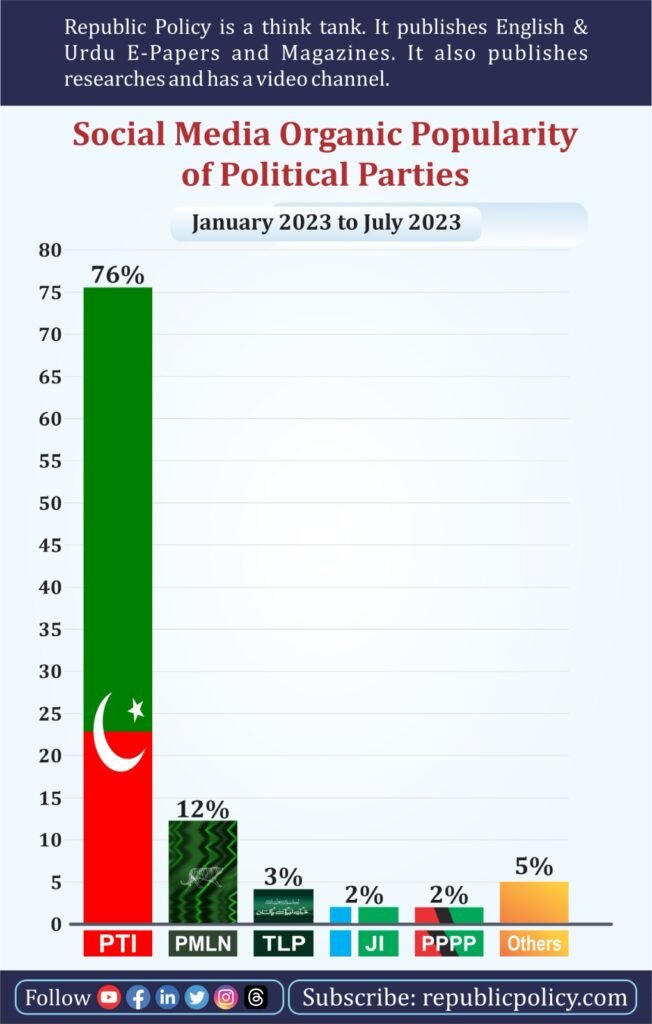
The PTI has effectively harnessed the power of digital and social media for its political advantage, building a large and active online presence, employing sophisticated digital technologies and tools, and shaping public opinion and discourse. However, the party has also been criticized for using digital and social media, including spreading misinformation and propaganda.
The popularity of Imran Khan and PTI on digital and social media is challenging to measure accurately due to various factors such as bots, fake accounts, paid promotions, algorithms, hashtags, trends, and viral content. However, according to Gallup Pakistan and Republic Policy surveys, Imran Khan and PTI have a significant lead over their rivals regarding approval ratings and popularity on social media platforms.
Journalists, social media activists, and influencers should project Imran Khan responsibly by verifying the accuracy of their sources, respecting diversity, protecting their privacy and security, abiding by laws and regulations, and challenging unjust restrictions.
Republic Policy was incepted on 1st January 2023 by a team of volunteers. It is comprised of retired civil servants, police officers, professionals, and lawyers as volunteers. It covers the subjects of governance, civil services, human rights, law, art, literature, reforms, politics, and economy. Republic Policy is a think tank comprised of a media firm, two consultancy firms, and two NGOs. As a research think tank, data collection is the primary objective, and therefore, Republic Policy constantly conducts surveys to collect data, both on social media and in the field, including data on politics. Republic Policy has been conducting social media polls to evaluate political trends since January 2023. The data was collected from five basic applications: Facebook, Twitter, YouTube, TikTok, and Instagram. The data has been collected out of multiple questions ranging from the popularity to the performance, covering all aspects of politics, governance, and human rights.
The poll was conducted on 25 May, 2023 with a sample size of 36933 votes.
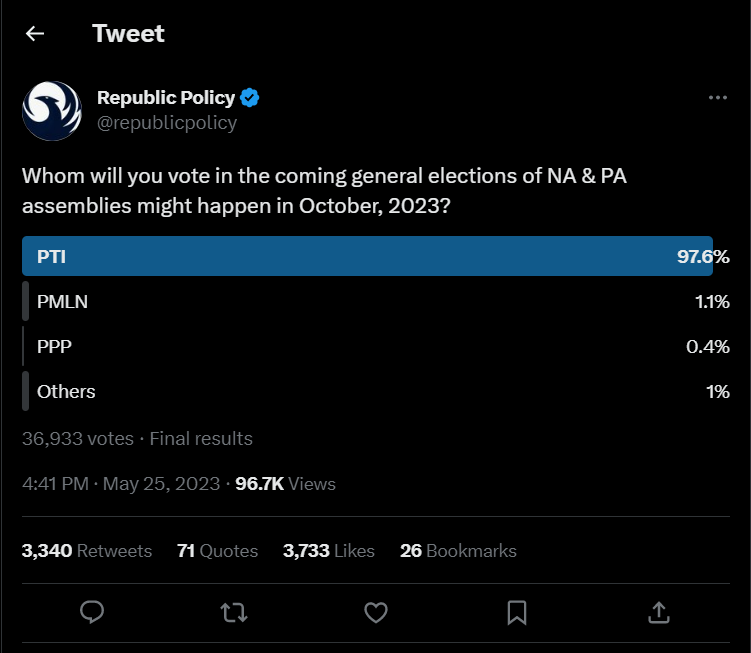
PTI is the most popular party on Twitter. The Twitter audience is politically more opinionated. Other political parties need help to develop organic support here despite their social and digital media investments. Instagram is a fashionable crowd. Although the forum is apolitical, PTI has decisive support here. TikTok is the social media of villeges, and PTI is viral here. It is the most significant medium which has changed the landscape of politics in villages. Then, YouTube also gives more views to those who discuss PTI and Imran Khan, positively or negatively. Facebook is the most significant social media application in Pakistan. PTI is also the most popular political party here; however, PMLN and other parties are also present here as the medium is conservative and attracts more ordinary people.
There are many possible reasons why PTI is popular on social media platforms, but here are some of the most common ones. PTI has a large and active social media team that uses various platforms to spread its message, mobilize its supporters, and counter its critics. Despite their limited digital media teams, their organic support makes their posts viral and disseminated. The primary reason for their popularity on social media platforms is that PTI has a charismatic and influential leader in Imran Khan, who has a massive fan following both in Pakistan and abroad. Imran Khan is widely admired for his achievements as a cricketer, philanthropist, and politician. He is also seen as a symbol of change, honesty, and justice by many of his supporters. Imran Khan has more than 19.09 million followers on Twitter and more than 14 million followers on Facebook, making him one of the most popular political figures on social media.
Then, PTI has a young and tech-savvy voter base that is more likely to use social media platforms than other population segments. According to the 2023 census, Pakistan has a population of more than 250 million, of which more than 65% are under the age of 30. This demographic group is more inclined to support PTI’s agenda of reform, accountability, and development. They are also more familiar with and adept at using digital technologies to access information, express opinions, and participate in political processes. Furthermore, PTI has a strong narrative and vision that resonates with many people on social media platforms. PTI’s slogan of “Haqeeqi Azadi” ( A state for Rule of Law) appeals to many people who are dissatisfied with the status quo and want to see a positive change in the country. PTI’s manifesto and policies also address some of the key issues and challenges facing Pakistan, such as corruption, poverty, education, health, environment, and foreign relations. PTI’s narrative and vision are often amplified and reinforced by its social media team and supporters, who create and share content that highlights the achievements and goals of the party.
A Social Media Poll by Republic Policy where Bots were involved. Now, Bots are also invested in the social media polls. However, team Republic Policy dissects them and measure the political trends accurately.
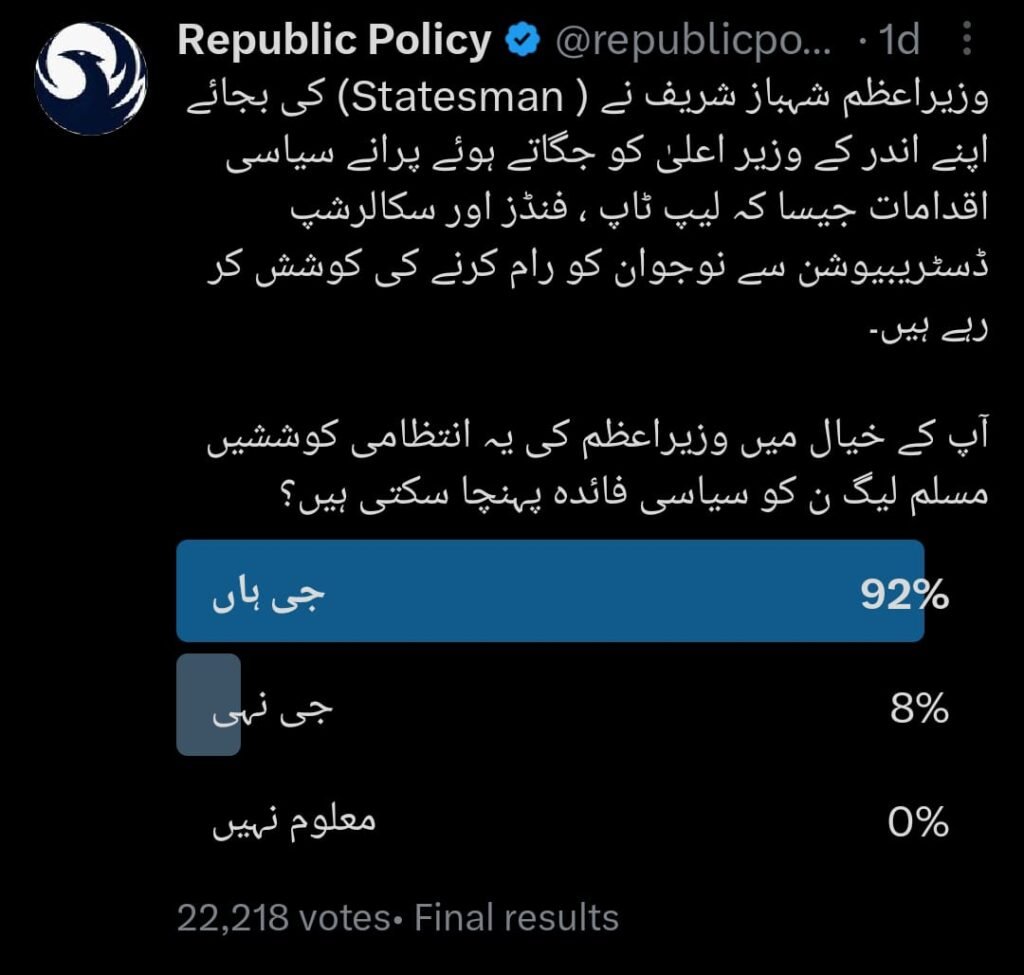
Lastly, the overseas population admire Imran Khan and the PTI more than any other political party. They are the real force of PTI. As they live from Australia to the USA, they are present 24/7 on different social media applications. They also join the social media applications and provide genuine organic support to the PTI. PMLN has quality social media teams operating on all social media applications; however, they have yet to receive organic support from social media users. TLP also has better organic support, followed by Jamat e Islami. Lastly, the reason for the popularity of PTI on social media may be adjudged briefly from the following points.
Early adoption of social media: PTI was one of the first political parties in Pakistan to recognize the importance of social media and to invest heavily in it. The party launched its social media accounts in 2011 when social media was still in the early stages of development in Pakistan. PMLN and PPPP, on the other hand, were slower to adopt social media.
Active and engaged social media team: PTI has a dedicated social media team that is responsible for creating and sharing content, engaging with followers, and responding to comments and messages. The team is also active in monitoring social media trends and using them to shape the party’s messaging. PMLN and PPPP’s social media teams are less active and engaged.
Use of technology: PTI has invested heavily in social media technology, such as social media analytics tools and social media management platforms. This allows the party to track its performance on social media and to identify areas where it can improve. PMLN and PPPP have not invested as heavily in social media technology.
Focus on youth: PTI’s social media content is targeted primarily at young people. The party uses social media to connect with young people on issues that are important to them, such as education, employment, and social justice. PMLN and PPPP’s social media content is less focused on youth.
Effective use of visuals: PTI uses visuals, such as videos, images, and infographics, to make its social media content more engaging and informative. The party also uses social media to livestream its events and to share behind-the-scenes content. PMLN and PPPP’s use of visuals on social media is less effective.
6. Use of humour: PTI often uses humour in its social media content to connect with its followers on a more personal level. The party also uses humour to satirize its opponents. PMLN and PPPP’s social media content is less likely to be humorous.
Celebrity support: PTI has the support of a number of Pakistani celebrities, including actors, singers, and sports stars. These celebrities often promote PTI on their social media accounts, which helps the party to reach a wider audience. PMLN and PPPP have the support of fewer celebrities.
Narrative building: PTI has been effective in building a narrative around its leader, Imran Khan, and its core values. The party’s social media content is constantly reinforcing this narrative. PMLN and PPPP have been less effective in building a strong narrative.
Mobilization of supporters: PTI is very effective in mobilizing its supporters through social media. The party uses social media to organize protests, rallies, and other events. PMLN and PPPP are less effective at mobilizing their supporters through social media.
Perception of being a new and different kind of party: PTI is perceived by many people as being a new and different kind of party, one that is not tainted by the corruption and nepotism that is associated with other political parties. This perception is reflected in the party’s social media content, which often criticizes the status quo and promises a better future for Pakistan. PMLN and PPPP are seen as more traditional parties, and their social media content reflects this.
Therefore, PTI is more popular on social media than PMLN, PPPP, and other political parties for a number of reasons, including its early adoption of social media, its active and engaged social media team, its use of technology, its focus on youth, its effective use of visuals, its use of humour, its celebrity support, it’s narrative building, its ability to mobilize supporters, and its perception of being a new and different kind of party. They have organic and volunteer support on social media, which other political parties have yet to attract.
Another type of measuring social media popularity. The reach is more than 529 K and PTI is in the massive lead. This type of poll or a poll with comments is more authentic as identity of the ID is mentioned.
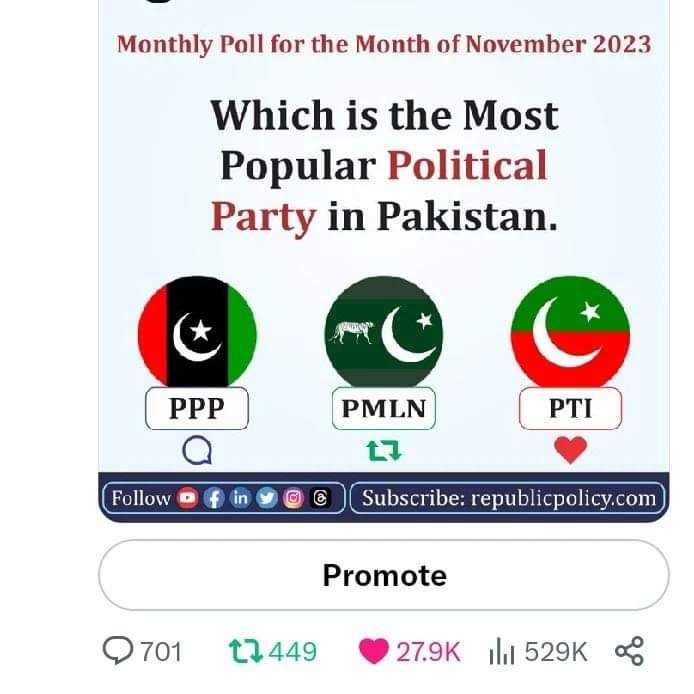
Republic Policy has conducted hundred of polls on all social media applications, and also have collected data of other polls. The trend is one and that is PTI is clear favorite on all social media applications and their collective support is more than 81 percent.



